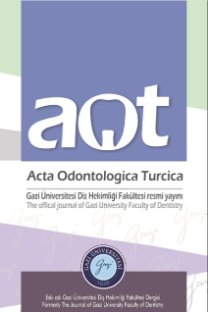MAKSİLLER TRANSVERS DARLIĞIN DÜZELTİMİNDE KULLANILAN LEAF EKSPANSİYON APAREYİNİN REAKTİF KUVVETLERİNİN BELİRLENMESİ
AMAÇ: Bu çalışmanın amacı, in-vitro ortamdaki genişletme esnasında Leaf Ekspansiyon vidalarının oluşturduğu reaktif kuvvetleri belirlemektir. GEREÇ VE YÖNTEM: Çalışmada 450 g-6 mm, 900 g-6mm, 450 g-9 mm ve 900 g-9 mm olmak üzere 4 çeşit Leaf Ekspansiyon vidası kullanılmıştır. Bu vidaların açılma (uzama) miktarına bağlı olarak çeneye uyguladığı kuvvetler çalışmaya özgü olarak tasarlanarak üretilen küçük boyutlu bir kuvvet ölçüm cihazı ile ölçülmüştür. Her bir vidanın ürettiği kuvvet açılma mesafesine bağlı olarak belirlenmiştir. Mikrometre her adımda 0.01 mm hareket ettirilerek apareyin yük hücresinde oluşturduğu kuvvet bir yük hücresi yardımıyla ölçülmüştür. Bu kuvvetler bir yazılım programında kayıt altına alınmış ve kuvvetin açılma miktarına bağlı değişimini veren grafikler oluşturulmuştur. BULGULAR: 450 g-6 mm, 900 g-6 mm, 450 g-9 mm ve 900 g-9 mm Leaf Ekspansiyon apareylerinin oluşturduğu kuvvetler sırasıyla 422.7 ± 94.1 g, 778.5 ± 142.2 g, 421.1 ± 53.8 g ve 851.4 ± 146.8 g olarak ölçülmüştür. SONUÇ: Test edilen tüm Leaf Ekspansiyon vidalarında ölçülen kuvvetler, firmanın belirtiği nominal kuvvet değerlerine yakın ve kabul edilebilir sınırlar içeresinde bulunmuştur.
Anahtar Kelimeler:
Maksiller ekspansiyon, Sıkıştırıcı Kuvvet, Titanyum nikelid
EVALUATION OF REACTIVE FORCES OF LEAF EXPANDER APPLIANCE USED IN CORRECTION OF MAXILLARY TRANSVERSE DISCREPANCY
ABSTRACT OBJECTIVE: The aim of this study is to determine the reactive forces of Leaf Expanders during expansion in invitro environment. MATERIALS AND METHOD: In this study, 4 types of Leaf Expansion screws, 450 g-6 mm, 900 g-6mm, 450 g-9 mm and 900 g-9 mm, were used. The forces applied by these screws to the jaw depending on the amount of opening (elongation) were measured with a small-sized force measuring device designed specially for this study. The force produced by each screw was determined depending on the opening distance. The force created by the appliance in the load cell was measured with the load cell by moving the micrometer 0.01 mm at each step. These forces were recorded in a software program and graphs were created showing the changes in force-depending on the amount of opening. RESULTS: The forces produced by the Leaf Expansion appliances were measured as 422.7 ± 94.1 g, 778.5 ± 142.2 g, 421.1 ± 53.8 g and 851.4 ± 146.8 g, respectively. CONCLUSION: The forces measured in all Leaf Expansion screws tested were close to the nominal force values reported by the company and were within acceptable limits.
Keywords:
Maxillary expansion, Compressive strength, Titanium nickelide,
___
- 1. Kiliç N, Oktay H. Effects of rapid maxillary expansion on nasal breathing and some naso-respiratory and breathing problems in growing children: a literature review. Int J Pediatr Otorhinolaryngol 2008;72:1595-601.
- 2. Algharbi M, Bazargani F, Dimberg L. Do different maxillary expansion appliances influence the outcomes of the treatment? Eur J Orthod 2018;40:97-106.
- 3. Ferrario VF, Garattini G, Colombo A, Filippi V, Pozzoli S, Sforza C. Quantitative effects of a nickel‐titanium palatal expander on skeletal and dental structures in the primary and mixed dentition: a preliminary study. Eur J Orthod 2003;25:401-10.
- 4. Arndt WV. Nickel titanium palatal expander. J Clin Orthod 1993;27:129-37.
- 5. Corbett MC. Slow and continuous maxillary expansion, molar rotation, and molar distalization. J Clin Orthod 1997;31:253-63.
- 6. Wichelhaus A, Geserick M, Ball J. A new nickel titanium rapid maxillary expansion screw. J Clin Orthod 2004;38:677-80.
- 7. Lanteri C, Beretta M, Lanteri V, Gianolio A, Cherchi C, Franchi L. The Leaf expander for non-compliance treatment in the mixed dentition. J Clin Orthod 2016;50:552-60.
- 8. Lanteri V, Gianolio A, Gualandi G, Beretta M. Maxillary tridimensional changes after slow expansion with leaf expander in a sample of growing patients: a pilot study. Eur J Paediatr Dent 2018;19:29-34.
- 9. Vella M, Cressoni P, Tripicchio C, Mainardi E, Esposito L. Early treatment with a slow maxillary Ni–Ti Leaf Springs Expander. Appl Sci 2021;11:4541.
- 10. Gianolio A, Lanteri C, Lanteri V, Cherchi C. A new device for calibrated maxillary expansion: The nickel titanium Memoria Leaf Spring Activated Expander. OrthoNews 2015;38:1-9.
- 11. Benhamour S, Brezulier D. Hyrax versus Leaf expander in growing patients, what about adverse dental effects? A retrospective study. Int Orthod 2022;20:100684.
- 12. Paoloni V, Giuntini V, Lione R, Nieri M, Barone V, Merlo MM, et al. Comparison of the dento-skeletal effects produced by Leaf expander versus rapid maxillary expander in prepubertal patients: a two-center randomized controlled trial . Eur J Orthod 2022;44:163-9.
- 13. Serafin M, Fastuca R, Caprioglio A. CBCT analysis of dento-skeletal changes after rapid versus slow maxillary expansion on deciduous teeth: a randomized clinical trial. J Clin Med 2022;11:4887.
- 14. Marzban R, Nanda R. Slow maxillary expansion with nickel titanium. J Clin Orthod 1999;33:431-41.
- 15. Huynh T, Kennedy DB, Joondeph DR, Bollen AM. Treatment response and stability of slow maxillary expansion using Haas, hyrax, and quad-helix appliances: a retrospective study. Am J Orthod Dentofacial Orthop 2009;136:331-9.
- 16. Bishara SE, Staley RN. Maxillary expansion: clinical implications. Am J Orthod Dentofacial Orthop 1987;91:3-14.
- 17. Bell RA. A review of maxillary expansion in relation to rate of expansion and patient's age. Am J Orthod 1982;81:32-7.
- 18. Camporesi M, Franchi L, Doldo T, Defraia E. Evaluation of mechanical properties of three different screws for rapid maxillary expansion. Biomed Eng Online 2013;12:128.
- 19. Lowe R, Makowka S, Manzella K, Warunek S, Al-Jewair T. Mechanical properties of the NiTi Memoria Leaf Spring Activated Expander (NiTi MLSAE) for maxillary transverse discrepancy correction: an in-vitro study. J Clin Exp Dent 2020;12:e154-60.
- 20. Halazonetis DJ, Katsavrias E, Spyropoulos MN: Changes in cheek pressure following rapid maxillary expansion. Eur J Orthod 1994;16:295–300.
- Yayın Aralığı: Yılda 3 Sayı
- Başlangıç: 1984
- Yayıncı: Gazi Üniversitesi Diş Hekimliği Fakültesi Dergisi
Sayıdaki Diğer Makaleler
Kendinden bağlamalı iki farklı braket sisteminin başlangıç seviyeleme etkinliğinin karşılaştırılması
Tuğçe KAŞIKCIOĞLU, Hande PAMUKÇU, Ayça ARMAN-ÖZÇIRPICI, Ömür POLAT-ÖZSOY
Özgün YILDIRIM, Halil ERSOY, Bekem SAATCI, Nur MOLLAOĞLU
Umut PAMUKÇU, Hatice TETİK, İlkay PEKER, Övgücan Karadağ ERDEMİR, Zühre ZAFERSOY AKARSLAN
